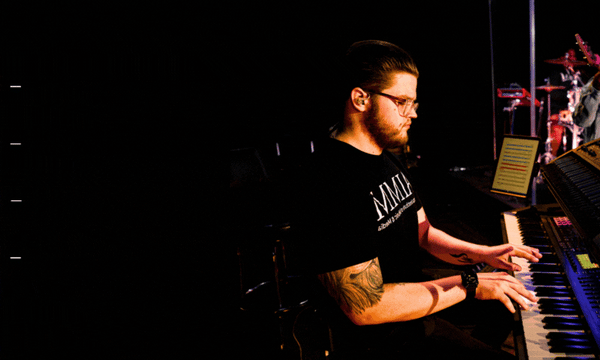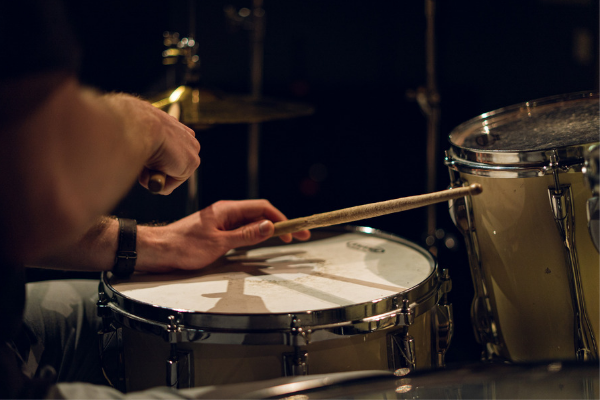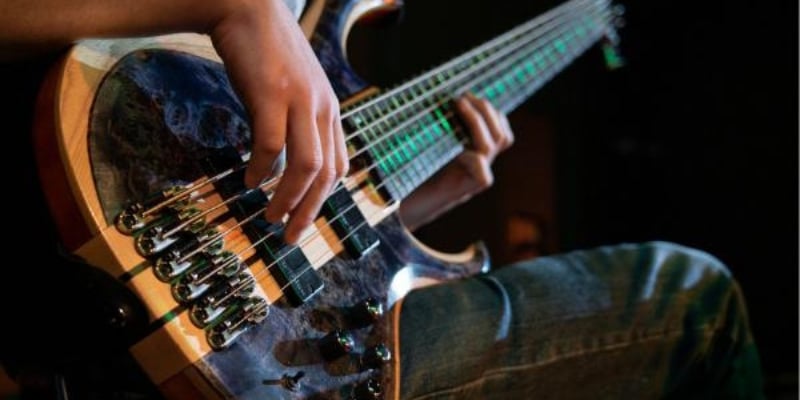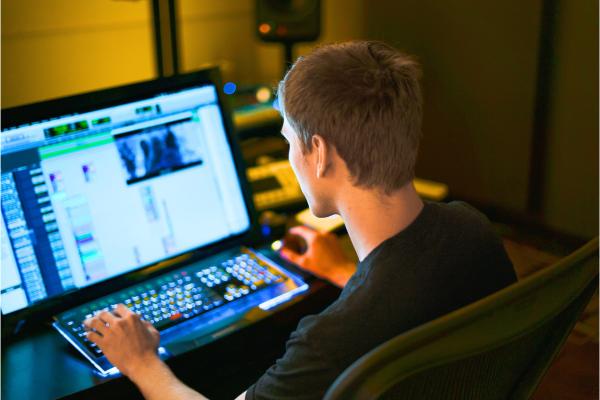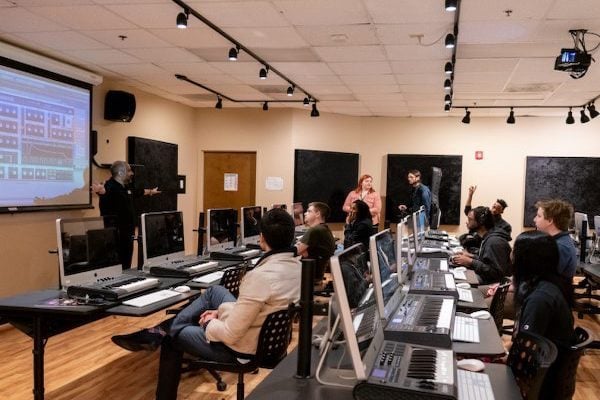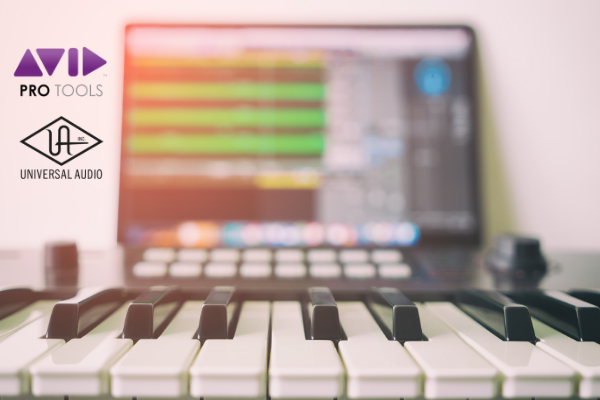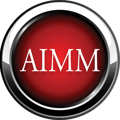Music and Technology Associate Degree: Keyboard Concentration

Associate of Applied Science in Music and Technology: Keyboard Concentration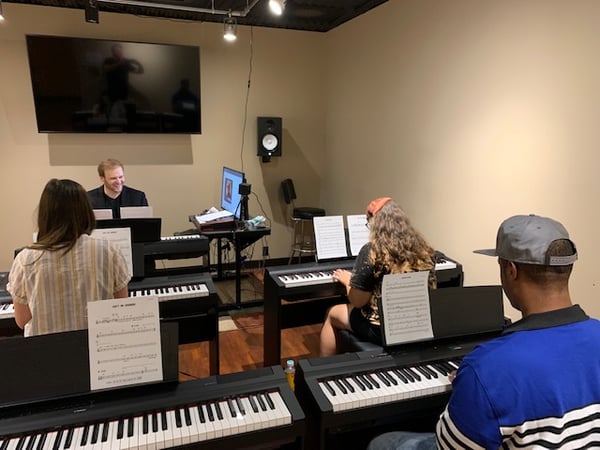
The Music and Technology Associate Degree: Keyboard Concentration offers the intermediate musician a fully immersive, nonstop music atmosphere.
AIMM's music program and Music and Technology Degree caters to the modern musician who, in order to thrive in today’s competitive music business, wants to develop both their technical keyboard skills and acquire an in-depth understanding of the writing, recording, mixing, and mastering process.
If you’re an undergraduate student looking to push your musical and technical skills to the next level through specially designed courses and a rigorous curriculum, then AIMM's Music and Technology Associate Degree with a concentration in Keyboard is perfect for you.
*Alumni Spotlight*
When you graduate from AIMM, you're ready for the big stage. AIMM alumnus Stephen Freeman is currently touring with Kendrick Lamar on keys.
What collaborative opportunities are waiting for you after attending AIMM?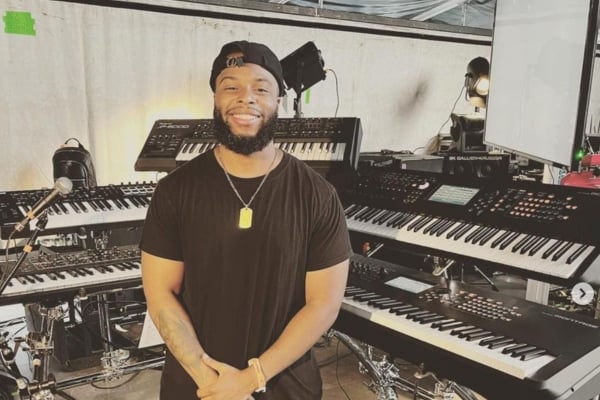 What could you accomplish after attending AIMM?
What could you accomplish after attending AIMM?
Blending Keyboard and Music Engineering
Piano and keyboard students alike will not only graduate from AIMM with an Associate Degree in Music and Technology, but it is our goal that you will also have put together an impressive portfolio of your work and musical abilities.
The portfolio you develop in our school of music will benefit you to find employment or self-employment in the fields of performance or music production. Your experience and diverse portfolio of skills will make you a prime candidate for not only record labels but also video games, movies, television, radio, multi-media production studios, and more.
In addition to mastering the keyboard with the best techniques, utilizing the number system, and music theory, you'll become skilled in music production.
With AIMM as your first step, your career opportunities will be endless. If you remain in good standing throughout the program, you will be eligible to take AVID Certification Exams to become Pro Tools Certified.
As an AVID Training Partner, AIMM offers you the opportunity to become AVID Pro Tools Certified as you progress through the curriculum. AIMM also focuses on Ableton Live, which bridges the divide between creative music production and live performance.
Using Pro Tools and Ableton Live, you will learn analog and digital music production, microphone techniques, virtual instruments, and effect plugins, as well as hone your education in music theory essentials and keyboard skills for the digital audio workstation.
Important note: This comprehensive music program is intended for intermediate musicians. Therefore, you must complete a successful audition, demonstrating proficiency in the instrument of your focus as detailed in the Admissions procedures. If you have any Admissions questions, please email admissions@aimm.edu.
Click here to view our E-Brochure.
Keyboard Student Success Timeline
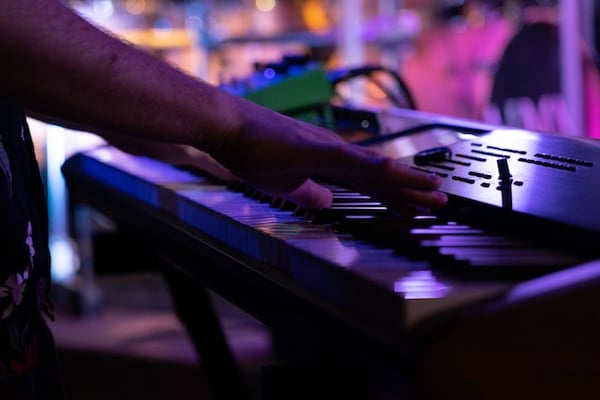 This program can be completed in 18 months of accelerated studies, 24 months of full-time enrollment, or 30 months of ¾ time enrollment.
This program can be completed in 18 months of accelerated studies, 24 months of full-time enrollment, or 30 months of ¾ time enrollment.
Check out all of the Georgia Cities that AIMM's Keyboard Degree serves.
The opportunities and choices are there to make it easiest for you and your lifestyle.
Upon completion of this program, students in good standing will not only graduate with an Associate Degree but will also be given the opportunity to take AVID Certification Exams to become Pro Tools certified.
This Digital Audio Workstation (DAW) certificate can set you apart and will be one of your greatest assets when looking for a job in your field.
Prior to graduation, all Music and Technology program students must fulfill all degree requirements and complete the required number of General Education credits.
Transfer students can transfer credits from other academic institutions, but you must demonstrate the appropriate comparability to the applied nature of each course.
If you want to push your keyboard skills to the next level, get more information about the Associate of Applied Science in Music and Technology Degree: Keyboard Concentration today!
Career Opportunities With A Music Performance Degree In Keyboard
A keyboard degree from a well-respected school of music can open up many career paths. Whether you're interested in performing, teaching, or working behind the scenes in the music industry, this comprehensive program equips you with the skills and knowledge you need.
Graduates can pursue careers in music as performers, composers, music therapists, music educators, music directors, or recording engineers. With a strong background in keyboards, music, and technology, you'll be well-prepared to work in various settings, from schools and theaters to recording studios and concert halls.
Courses and Curriculum
AIMM offers a diverse range of music courses that cater to both intermediate and advanced students. Students receive a well-rounded education from foundational courses in music theory to specialized classes in keyboard techniques and music production.
Undergraduate coursework includes both practical and theoretical studies, ensuring students gain a deep understanding of music and its various aspects. High-achieving undergraduate students may also have the opportunity to participate in masterclasses, workshops, and recitals, further enhancing their music skills and knowledge.
Keyboard Faculty Expertise and Mentorship
At the heart of our keyboard program is our esteemed keyboard faculty, a team of dedicated professionals with a rich music background and extensive industry experience. Our faculty members are not just educators; they are active performers, composers, and music directors who bring a wealth of knowledge to the classroom.
As a student, you'll benefit from one-on-one mentorship, gaining insights into the artistic and technical aspects of music performance. Whether you're an intermediate musician or an advanced player, our faculty will guide you, ensuring you receive a comprehensive education tailored to your skill level. They are dedicated to preparing each student for a successful career in music.
AIMM Also Offers...
In addition to our degree programs, AIMM offers specialized certificate programs to enhance your professional skills and marketability in the music industry. These certificate programs focus on specific areas of study, allowing students to dive deeper into subjects like music production, sound engineering, and keyboard mastery.
Our certificate programs are perfect for individuals who want to gain a competitive advantage in the music industry or specialize in a specific area of music. We prioritize practical training to ensure our students work closely with our Keyboard Faculty and other industry experts, acquire hands-on experience, and develop an impressive portfolio.
From mastering advanced keyboard techniques to understanding the intricacies of music production software like Pro Tools and Ableton Live, our certificate programs offer a comprehensive approach to music education. Whether you're looking to enhance your professional skill set or explore new fields of performance, our certificate programs provide the training and expertise you need.
Associate of Applied Science in Music and Technology
With a Concentration in Keyboard
Core Courses — Students Must Complete 54 Credits
| Course Number | Course Title | Credits |
| INT100 | Performance I * This course is an interdisciplinary live performance class based on standard introductory level repertoire for R'n'B, Blues, Rock and Pop styles. Students perform on stage weekly in a live interactive ensemble format with voice and rhythm section instrumentation that emulates professional gigging scenarios. The emphasis is on execution of melody, rhythm, chords, form, and improvisation. Materials such as sheet music, charts, play along tracks, lyrics, video tutorials are provided via Canvas Learning Management System. |
4 |
| INT200 | Performance II * This course is an interdisciplinary live performance class based on standard intermediate level repertoire for R'n'B, Blues, Rock and Pop styles. Students perform on stage weekly in a live interactive ensemble format with voice and rhythm section instrumentation that emulates professional gigging scenarios. The emphasis is on execution of melody, rhythm, chords, form, and improvisation. Materials such as sheet music, charts, play along tracks, lyrics, video tutorials are provided via Canvas Learning Management System. Prerequisite : INT100 Performance I |
4 |
| INT300 | Performance III This course is an interdisciplinary live performance class based on standard intermediate-advanced level repertoire for R'n'B, Blues, Rock and Pop styles. Students perform on stage weekly in a live interactive ensemble format with voice and rhythm section instrumentation that emulates professional gigging scenarios. The emphasis is on execution of melody, rhythm, chords, form, and improvisation. Materials such as sheet music, charts, play along tracks, lyrics, video tutorials are provided via Canvas Learning Management System. Prerequisite : INT200 Performance II |
4 |
| INT400 | Performance IV This course is an interdisciplinary performance class based on standard advanced level repertoire for R'n'B, Blues, Rock and Pop styles. Students perform on stage weekly in a live interactive ensemble format with voice and rhythm section instrumentation that emulates professional gigging scenarios. The emphasis is on execution of melody, rhythm, chords, form, and improvisation. Materials such as sheet music, charts, play along tracks, lyrics, video tutorials are provided via Canvas Learning Management System. Prerequisite : INT300 Performance III |
4 |
| INT301 | Studio Performance III This course is an interdisciplinary studio performance class based on standard intermediate-advanced level repertoire for R'n'B, Blues, Rock and Pop styles. Students perform in the recording studio weekly in an interactive ensemble format with voice and rhythm section instrumentation that emulates professional recording sessions. The emphasis is on execution of melody, rhythm, chords, form, and improvisation. Materials such as sheet music, charts, play along tracks, lyrics, video tutorials are provided via Canvas Learning Management System. Prerequisite : INT200 Performance II |
4 |
| INT401 | Studio Performance IV This course is an interdisciplinary studio performance class based on standard advanced level repertoire for R'n'B, Blues, Rock and Pop styles. Students perform in the recording studio weekly in an interactive ensemble format with voice and rhythm section instrumentation that emulates professional recording sessions. The emphasis is on execution of melody, rhythm, chords, form, and improvisation. Materials such as sheet music, charts, play along tracks, lyrics, video tutorials are provided via Canvas Learning Management System. Prerequisite : INT301 Studio Performance III |
4 |
| INT145 | Music Theory Essentials I * This class covers the basic elements of music theory, ear training and notation. Diatonic harmony, major and minor key signatures, triads and 7th chords, scale harmonization, meters, basic rhythmic notation, and chord symbol conventions. Students will practice recognizing fundamental musical elements by ear. Basic keyboard skills will be covered including chords, scales and reading. |
3 |
| INT245 | Music Theory Essentials II * This class focuses on scales, modes and linear structures needed for improvisation and melody. Ear training and dictation of melody and diatonic chord progressions are covered. Advanced notation concepts including form, articulation and syncopated rhythm are included. Harmonic concepts are practiced and reinforced using a keyboard. Prerequisite : INT145 Music Theory Essentials I |
3 |
| KBD130 | Reading I * This class introduces the students to note-reading on the keyboard. Subjects include note recognition, intervals, chord shapes and rhythmic figures. Students will read together in a keyboard lab setting, and will be given individual exams. |
1 |
| KBD230 | Reading II * This class introduces the students to two-handed reading on the keyboard. Simple passages with bass lines and open-position chords are covered in various keys. Key signatures (5 and 6 sharps or flats) will be introduced. Students will read together in a keyboard lab setting and will be given individual playing exams. Prerequisite : KBD130 Reading I |
1 |
| KBD330 | Reading III This course focuses on chart and lead-sheet reading on the keyboard. Various ways to interpret a chart will be covered including simple accompaniment, solo piano, and piano trio styles. Swing, rock, and Latin rhythmic figures and textures are introduced. Students will read together in a keyboard lab setting and will be given individual playing exams. Prerequisite : KBD230 Reading II |
1 |
| KBD430 | Reading IV This course covers advanced reading for keyboard including lines with chromatic alterations, chords spread between two hands, altered chord shapes and advanced rhythmic figures. Students will read together in a keyboard lab setting, and will receive individual playing exams. Prerequisite : KBD330 Reading III |
1 |
| KBD120 | Scales I This class introduces keyboard students to the basic scales and chord forms used in contemporary musical performance. Major and minor scales, triads and basic voicings will be covered. Class will use keyboards in a lab setting to build muscle memory and technique. |
1 |
| KBD220 | Scales II This course focuses on the linear forms used for melody and improvisation as well as basic accompaniment figures used by the contemporary keyboard player. Major scale modes and patterns, pentatonic scales, melodic minor modes and chord-tone lines are studied. Prerequisite : KBD120 Scales I |
1 |
| KBD320 | Scales III This class covers a variety of harmonic voicings and patterns used in contemporary keyboard. Students will learn to harmonize melodic material and to accompany soloists in the ensemble. The techniques used to build a keyboard part and a keyboard-based arrangement will be covered. Prerequisite : KBD220 Scales II |
1 |
| KBD420 | Scales IV This class focuses on advanced voicings, patterns, and textures used in contemporary keyboard. Triads, 4ths, Upper structure, and parallel voicing are covered. Students will learn solo piano textures and arranging techniques. Prerequisite : KBD320 Reading III |
1 |
| RCD150 | Skills Lab * This lab course is designed to help the student gain awareness of “soft skills” such as behavior, habits, work ethic, etc. in a fun and engaging way. Students will complete the course with a better understanding of their own strengths and areas in need of improvement. Students will gain tools to help them succeed in their academics and beyond. |
1 |
| RCD430 | Music Business * Students will learn about the music business through a series of lectures covering copyrights, entertainment agency contacts, trademark/service mark, resume creation, tax deductions, artist management and split agreements. the changing record industry, performing rights organizations, demo and pro-tape kit creation and health and safety of the engineering industry. |
1 |
| RCD100 | Pro Tools 101 * This course introduces basic principles a student needs to understand how to complete a ProTools project, from initial setup to final delivery. Topics include purposes and uses of edit tools, modes, various track and signal clip functions for recording, editing, and importing audio, MIDI, and video used for music and media production. Included with the course textbook are media files for Pro Tools 101 exercises and hands-on projects. |
2 |
| RCD130 | MIDI: Synthesis and Sequencing * This course is an introduction to the MIDI language, using Ableton Live and Native Instrument’s Komplete Bundle as the vessel of instruction. This course demonstrates core concepts such as the basic MIDI environment, sequencing, sampled-based and synthesis instruments, automation, and final steps for MIDI-based production including mixing and effects processing. |
4 |
| RCD140 | Introduction to Audio Production I * This course gives the student an introduction to, and a strong foundation in, audio production techniques, including an introduction to analog recording history, physical properties of sound, basic microphone types, recording environments, mono and stereo microphone techniques as well as basic analog signal flow and analog signal processing including equalization and dynamic processing techniques. |
3 |
| RCD200 | Pro Tools 110 * This course builds on the introductory Pro Tools 101 course, evolving basic Pro Tools principles while providing the student with the essential processes needed to complete a Pro Tools project, from initial set up to final mixdown, and to take the Avid Pro Tools 110 Specialist Certification exam. The course teaches intermediate Pro Tools techniques, covering key concepts and skills needed to operate a Pro Tools system. Topics include Hardware I/O setup and routing, Elastic Audio, internal Bus path usages for send/returns, automation, and more. Included with the course textbook are media files for Pro Tools 110 exercises and hands-on projects. Students in good standing will have the opportunity to take the Avid Pro Tools 110 Specialist Certification exam upon course completion. Prerequisite : RCD100 Pro Tools 101 |
2 |
| RCD240 | Introduction to Audio Production II * This course gives the student a more advanced introduction and foundation to audio production techniques including principles of analog & digital audio production and recording and data storage and playback media for digital audio formats. The student will gain an advanced understanding of large format analog console signal flow, time-based processors and an introduction to plug-in processing. Prerequisite : RCD140 Introduction to Audio Production I |
3 |
| Total | 54 | |
Elective Courses — Students Choose 16 Out of 43 Credits
| Course Number | Course Title | Credits |
| KBD910 | Group Lesson I (elective instrument) Students receive two hours of group instruction weekly to address areas of technique or theory for which they require assistance. |
2 |
| KBD920 | Group Lesson II (elective instrument) Students receive two hours of group instruction weekly to address areas of technique or theory for which they require assistance. Prerequisite : KBD910 Group Lesson I |
2 |
| KBD930 | Group Lesson III (elective instrument) Students receive two hours of group instruction weekly to address areas of technique or theory for which they require assistance. Prerequisite : KBD920 Group Lesson II |
2 |
| KBD940 | Group Lesson IV (elective instrument) Students receive two hours of group instruction weekly to address areas of technique or theory for which they require assistance. Prerequisite : KBD930 Group Lesson III |
2 |
| INT345 | Music Theory Essentials III This course focuses on the chord progressions and harmonic techniques used in contemporary music. Concepts include diatonic, extended diatonic and chromatic progressions, modulations and reharmonization. The keyboard is used to illustrate and reinforce these concepts. Students explore melodic, rhythmic and harmonic transcription, and basic desktop music publishing is covered. Prerequisite : INT245 Music Theory Essentials II |
3 |
| INT445 | Music Theory Essentials IV This course explores advanced harmonic and melodic techniques used in modern music. Melodic writing, harmonization, voice-leading and arranging are covered. Students will compose and arrange music using the techniques discussed, and will apply these ideas on the keyboard. Prerequisite : INT345 Music Theory Essentials III |
3 |
| RCD205 | Studio Interconnect Basics * This course teaches the basics of studio connections and routing of electronics, various types of analog and digital cables and connections, and soldering basics, developing necessary skills commonly needed in professional and home studio environments. |
2 |
| RCD300 | Pro Tools HD 201 This course covers core concepts and skills needed to operate an Avid Pro Tools HD/Ultimate system in a professional studio environment, Included with the course textbook are media files for Pro Tools 201 exercises and hands-on projects. Prerequisite : RCD200 Pro Tools 110 |
2 |
| RCD320 | Electronic Music Production In this course, students will gain a broad understanding of the tools, production techniques and processes needed to successfully produce music and audio in the contemporary market. Techniques covered include working with and warping audio content in Ableton Live, use of various types of synthesized and drum machine sounds, MIDI and audio effect processors including arpeggiators, filters, saturation, sidechain compression, and more, while utilizing Ableton Live’s Racks and unique Session view for a digitally-based live performance setup and presentation. Prerequisite : RCD130 MIDI: Synthesis and Sequencing |
4 |
| RCD340 | Introduction to Music Production This course offers hands-on experience of the complete process for a professional music production inside AIMM studios, from beginning to end. The course moves the student through all stages of a music production from planning, to tracking demos, cutting basics, overdubs, vocal production, mixing and mastering. In each phase, students will learn a professional approach along with cutting edge techniques to utilize. In class, students will work with musicians and artists, and cover various roles utilized. Prerequisite : RCD240 Introduction to Audio Production II |
4 |
| RCD400 | Pro Tools HD 210M This course covers specific techniques for working with advanced professional Avid Pro Tools systems in a music production environment. The main topics in this course are followed by exercises that allow the student to practice concepts taught in class. Included with the course textbook are media files for Pro Tools 210M exercises and hands-on projects. Students in good standing will have the opportunity to take the Avid Pro Tools 210M Professional Certification exam upon course completion. Prerequisite : RCD300 Pro Tools 201 |
2 |
| RCD410 | Science and Art of Mastering This course provides an overview of concepts, techniques, equipment and environments used in the process of mastering a record. Topics include outlining the differences between a mixing engineer and mastering engineer, use standard mastering tools and approaches with digital software, and types of delivery standards required for various platforms and release formats, including digital streaming to vinyl records. Prerequisite : RCD100 Pro Tools 101 |
1 |
| RCD435 | Methods of Mixing In this course students will explore both creative and technical aspects of audio mixing necessary to mix in the modern music environment. This course introduces the steps of the mixing process including organization, tempo mapping, editing, equalization, compression, dynamic processing, time-based effects, automation, specialty effects, and printing final mixes. The techniques and concepts presented apply to any digital or analog mixing scenario. Prerequisite : RCD200 Pro Tools 110 |
5 |
| RCD350 | Introduction to Live Sound This course introduces all aspects of live venue sound systems and production, including signal flow for live applications, front of house and monitoring sound systems, speaker set up and rigging, microphone techniques for live applications, mixer routing and controls, proper power requirements and set up, room EQ, and communication with artists/musicians. The class consists of a one-hour lecture paired with a one-hour lab where students will practically apply the skills covered in the lecture. |
2 |
| RCD530 | Portfolio and Web Media In this course students will gain the knowledge necessary to market themselves in the ever changing audio industry. This course will help students connect their academic work and studio experiences to a digital environment where they can present themselves to employers in a professional manner. The students will analyze and create business card templates, digital showreel demos for online platforms, and deliver an electronic portfolio for completion of the program. Prerequisite : RCD130 MIDI: Synthesis and Sequencing |
3 |
| RCD550 | Media Composer Fundamentals I In this course students will use the Media Composer 101: Media Composer Fundamental I coursework that covers specific topics for working with Media Composer in a professional video production environment. Prerequisite : RCD200 Pro Tools 110 |
2 |
| RCD560 | Media Composer Fundamentals II In this course students will use the Media Composer 110: Media Composer Fundamental II coursework that covers specific topics for working with Media Composer in a professional video production environment. Video Production II is for students and video editors who already have beginning knowledge of editing in Media Composer, and are ready to broaden their foundational skills and knowledge. Prerequisite : RCD550 Media Composer Fundamentals I |
2 |
| Total |
43 |
|
| Elective Credits Required | 16 | |
Required General Education Courses — Students Must Complete 24 Credits
| Course Number | Course Title | Credits |
| HUM110 | Creative Writing This course covers different kinds of writing across multiple genres, including—but not limited to—poetry, fiction, nonfiction and hybrid forms. Students will be encouraged to experiment with these forms of writing, to step out of their comfort zone and challenge their own preconceptions of where writing can take them. The great Russian writer Anton Chekhov once said, “don’t tell me the moon is shining; show me the glint of light on broken glass.” In essence, Chekhov is illustrating one of the most important principles of creative writing: the act of describing through imagery rather than simply “telling.” This course will take Chekhov’s dictum to heart by practicing reading and writing in each genre with an eye towards drafting, writing, and revising original compositions. |
3 |
| HUM115 | English Composition This class introduces students to the fundamentals of writing. Students will study standard English grammatical and syntactical conventions to ground our composition skills in the systems and structures that will make our writing legible to a general audience of standard English readers. Students also practice brainstorming, drafting, and revising in order to learn about the writing process, identify what works for us individually, and work towards making our processes more productive. Students will regularly apply what we have learned to different formal and informal genres to understand the transferability of standard English writing conventions and the praxis of writing texts across varying styles, forms, and purposes. |
3 |
| HUM120 | Music Appreciation This course is designed to expose students to a broad spectrum of musical ideas, concepts, and genres. Emphasis is placed on studying those musical concepts that hold true for all styles of music (form and structure, counterpoint, melodic and harmonic content). Genres covered include: Middle Ages; Renaissance; Baroque; Classical; Romantic; 20th Century; Jazz; Rock. |
2 |
| MAT110 | Accounting This course teaches the fundamental accounting and tax information needed to create a successful sound career in the music industry and digital media industries. It will include basic accounting and tax elements, information on setting up a business, selecting the appropriate type of business entity, and accounting aspects as related to various music and intellectual property transactions. |
3 |
| MAT120 | Mathematical Modeling This course covers applied algebra, linear, piecewise, exponential and quadratic functions. It focuses on logical problem-solving techniques required for critical thinking. Statistical analysis and probability will be used to analyze and explore real world data. In addition, students will develop a clear understanding of the role and function of quantitative analysis. This unit also focuses on skills needed to ensure students acquire better decision-making processes for money management in their personal and business lives. |
3 |
| SCI110 | Principles of Electronics |
3 |
| SCI120 | Physics of Sound This course introduces students to the physical nature of music and sound. Waves, sound propagation, harmonic content, the human hearing mechanism and musical instrument tone production are discussed. Psychoacoustics and perception of sound are included. |
3 |
| SOC110 | Cultural Anthropology Anthropologists take a broad approach to study and understand different aspects of the human experience. This course explores how people in different places live, use music, and interact with the world around them. Students will analyze select case studies from around the world. They will study the perspectives, practices, and social organization of other groups whose values and lifeways may be very different from their own.The knowledge they gain will enrich human understanding on a broader level. Special importance will be placed on global music styles that impact contemporary music including Indian classical music, West African Music, Brazilian Samba, Cuban music styles, and African-American folk music. |
3 |
| Total | 24 | |
| Program Total | 94 | |
Courses denoted with an asterisk (*) may be available to take online asynchronously. Please check with your Academic Advisor on availability.
Additional Music Program Options
Program Features
- Courses 39
- Credit Hours 94 hours
- Skill level Intermediate
- Language English
- Currently Enrolling Yes
